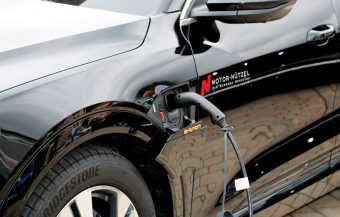
Artificial intelligence (AI) plays a significant role in e-mobility and sustainable transport globally, and Serbia is catching up with the world in this area. The application of AI in e-mobility and sustainable transport in our country can contribute to the optimization of traffic routes, better battery performance, development of autonomous driving, vehicle maintenance and efficient management of charging points. This technology yields numerous benefits, including reduced emissions, higher efficiency, and a better experience for electric vehicle users.
We spoke with Dragiša Mišković, PhD, research associate and Head of the Human Computer Interface research group at the Artificial Intelligence Institute of Serbia, about the extent and nature of using AI in e-mobility and sustainable transport in Serbia.
The vision of the Artificial Intelligence Institute of Serbia is to become a global centre of excellence in scientific research and technology transfer in the field of AI and machine learning, as well as to create innovative leaders in that domain. Artificial intelligence is the ability of a computer or computer-controlled robot to perform tasks normally associated with intelligent beings and refers to the simulation of human intelligence through machines programmed to think like humans and mimic their actions.
IN FOCUS:
- SOLAR ENERGY —SECURE SUPPLY
- CHARGE&GO CONTINUES TO BUILD A NETWORK OF CHARGER
- HOW TO PROPERLY MANAGE ENERGY CONSUMPTION
Q. How would you assess the development of e-mobility in our country?

A. Considering that e-mobility in Serbia is still developing, we face numerous challenges. Several key factors affect the e-mobility situation in Serbia, such as infrastructure for charging electric vehicles, incentives for their purchase, investments in research and development and providing support to startups and technology companies that deal with this segment. We also need to educate and raise awareness about the advantages of electromobility and the environmental and economic advantages of electric vehicles. These challenges are also typical for many other countries in the development stage of e-mobility. Thanks to appropriate infrastructure investments and incentives, Serbia has the potential to make progress in this area.
Q. What is Serbia’s position in this segment compared to the countries in the region that are also EU members? Which countries are the most developed when it comes to e-mobility?
A. In terms of the development of e-mobility, Serbia is in a similar position as other countries in the region. Electromobility is a relatively new industry developing rapidly worldwide, including the Balkan region. The Balkan countries, including Serbia, face similar challenges and opportunities related to e-mobility.
We should bear in mind that the situation in this segment is changing rapidly, and each country in the region has its own specific challenges and development strategies. It is crucial that countries in the region cooperate and exchange knowledge and experiences to accelerate development and achieve a sustainable transformation of the transport sector. Norway, the Netherlands, China, Germany, and Sweden are the leaders in e-mobility, as they have advanced systems, infrastructure, and initiatives to support the use of electric vehicles.
Q. To what extent are AI-based tools for e-mobility being developed and applied in Serbia?

A. Artificial intelligence is playing an increasing role in e-mobility worldwide. It is used to optimize the performance of electric vehicles, improve autonomous driving systems, manage battery charging, predict energy consumption, optimize logistics and more.
Electromobility, a key sector of the economy and a source of development potential is gaining increasingly important in the modern world due to concern for the environment and health. Our wider regional community has an exceptional opportunity to become one of the leaders in Europe in this field, using the abundance of experience, tradition, and expertise we possess in these domains.
Large foreign companies still lead the development of e-mobility in Serbia, and it is important to encourage the involvement of domestic companies and institutes. We also need to carry out timely planning activities to develop the infrastructure for the fifth-generation network (5G) and systematically approach the drafting of regulations. The relevant laws will facilitate the widespread use of electric and autonomous vehicles.
Interviewed by: Mirjana Vujadinović Tomevski
Read the story in the new issue of the Energy portal Magazine ELECTROMOBILITY



